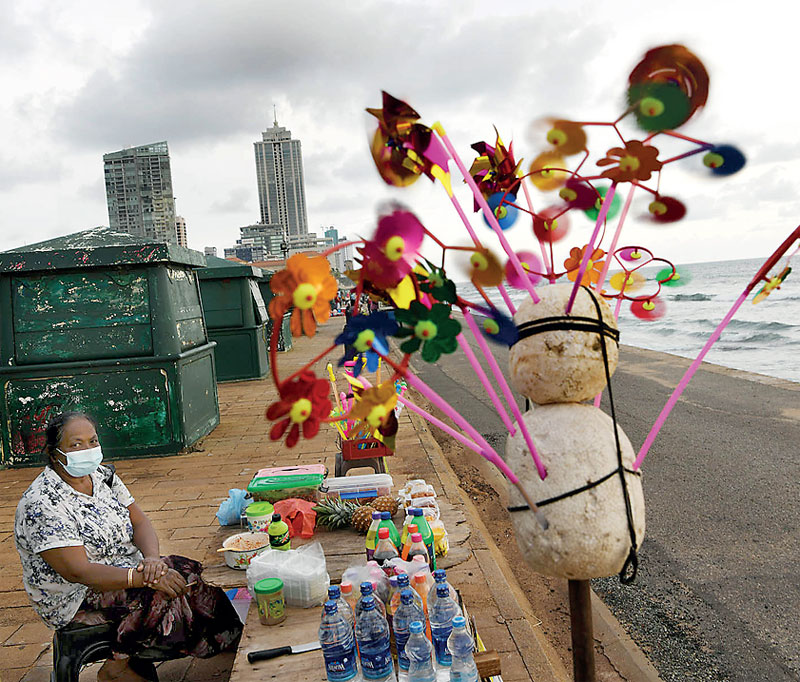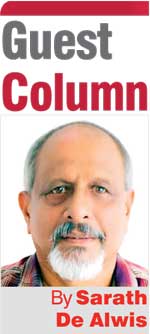Monday Feb 16, 2026
Monday Feb 16, 2026
Saturday, 6 November 2021 00:00 - - {{hitsCtrl.values.hits}}

The Socialist Democratic State has turned into a monstrous storehouse of unfulfilled promises – political, economic and moral
 It began with inchoate rage of students. They were protesting military Brahminism trespassing free education.
It began with inchoate rage of students. They were protesting military Brahminism trespassing free education.
What was rudimentary has turned into pronounced apoplectic rage of peasant, pedagogue, and priest. The State is perceived as lazy and leechlike.
The Socialist Democratic State has turned into a monstrous storehouse of unfulfilled promises – political, economic and moral.
These are uncertain times. We are in crisis. Antonio Gramsci, known as the practical Marxist thinker writing in his prison cell in Mussolini’s Fascist Italy, defined the kind of crisis that nations encounter when dissent is suppressed, and plurality is rejected.
“The crisis consists precisely in the fact that the old is dying and the new cannot be born; in this interregnum a great variety of morbid symptoms appear.”
We look around. We see morbid symptoms. There was a time when political power was not considered hereditary property.
Parliamentary system
On independence we received or adopted a parliamentary system. In 1978 the now extinct UNP led by J.R. Jayewardene imposed the presidential system.
The parliamentary system evolved through centuries of resistance to the tyranny of an anointed monarch. Presidentialism was devised by American rebels who wanted to replace mad king George. Donald Trump demonstrated the fragility of the system.
Born in early forties, I recall the sixties and seventies as the happiest of times.
Of course, there was import substitution. When traveling to Tokyo in the seventies, I did not eat the peanuts served on Cathay Pacific. I put them in a briefcase along with whatever else that will keep for a week or two for my two young children. I have stood in queue at the cooperative store for Oster milk for my child born in the epochal year 1970 when a party was returned to power with a two-thirds majority in Parliament.
The new government adopted a constitution that made us a republic. But we retained the parliamentary system.
Under the parliamentary system, dissent was possible, protest permitted, and accountability was an imperative dictated by the conscience of those in public life.
As Dante Alighieri warns while defining purgatory and heaven, “There is no greater sorrow than to recall a happy time when miserable.”
In sixties and early seventies, I reported Parliament for the Evening Observer. When compared to present-day misery, those were happier times. Parliament was a place where serious business was conducted.
Sometime in the late sixties, the Opposition moved a vote of no confidence against M.H. Mohamed, Minister of Labour in the Cabinet of Premier Dudley Senanayake.
The Opposition presented a cogent indictment. Prime Minister Dudley Senanayake, who was a combative debater, did not defend his Minister of Labour with any degree of gusto. It was obvious that his heart was not in it.
“We must give the Minister the benefit of the doubt,” was his final plea at which point Dr. Colvin R de Silva offered his memorable riposte, “In this country people don’t resign. They resign themselves to the new situation.”
That was the way Parliament functioned then. The Opposition exposed an errant Minister. The Prime Minister conceded the substance of the Opposition case while defending his Minister.
Presidential system
The presidential system as practiced since its introduction has systematically eroded the principle of accountability. It has reduced Parliament to a mere talk shop.
There is no connection between representatives and the represented. The appointment of a Task Force on ‘One Law, One Country’ concept is a sure signal that after 73 years as a nation state, on the matter of the principle of the rule of law we are totally adrift.
Tom Bigham, a great British jurist who has written extensively on the rule of law, offers this snippet: “Ask a man on the Strand ‘who rules you?’ If he replies ‘King James II, then he is in a monarchy. If he replies, ‘the law’, he is in a democracy.”
I asked the question from one of my grown-up granddaughters now in the first year in university. “Don’t be stupid,” she replied.
The rot set in with the adoption of presidentialism. Since 1978, our nation-state has quietly and surely got conditioned to cohabit with blatant, brutal injustice.
Injustice is a serious problem. One must either accept it or fight it. Worrying about injustice is neither here nor there.
Passage of time makes the injustice commonplace. With passage of time, you stop worrying because you have got used to the injustice.
The time has arrived for us to make an honest review of the perils of presidentialism and to revisit a return to a more robust parliamentary system.
Machiavelli was not a wicked man. He was an honest scholar who understood and chronicled human nature. He merely studied how good decent people in public life oscillate between virtue and fortune.
After his stint with the Medici family, he wrote a meticulous history of the City of Florence. Writing on the corruption of the city of Florence under the Medici family he reiterates his faith in the optimism of the human will: “… do not impute past disorders to the nature of the men, but to the times, which, being changed, give reasonable ground to hope that, with better government, our city will have better fortune in the future.”
Time for change
There is hope if we change the system.
Unless we are totally blind to reality, we must surely recognise that we have a national malignancy – a kind of a cruel cancer that is devouring the moral fibre of our society.
How long must we go about our daily lives acting as though nothing is wrong? How much effort must we exert to close our minds to the images of people suffering injustices?
Complacency is a luxury we can no longer afford. Since 1978, we have watched the abuse of power by successive regimes.
Now we learn that the Treasury Secretary under the Premadasa presidency had secret bank accounts in the British Virgin Islands. Will that news help mitigate the alleged sins of the power couple under the current dispensation as exposed in the Pandora revelations?
Let us be honest. Felix Dias as Minister of Justice ensured that Sir Oliver Goonatileke, a former Governor General, was brought before a Criminal Justice Commission. For his trouble, Felix Dias lost his civil rights under the presidency of J.R. Jayewardene.
There was a time when the high and mighty were held accountable even if the process had its pitfalls and inconveniences.
In our parliamentary democracy we had leaders – Sirimavo Bandaranaike and Dudley Senanayake – who took great pains to convey a visible sense of ethical leadership. They had their weaknesses. But they were not rotten.
Executive presidency
All that changed when J.R. Jayewardene introduced the executive presidency. To develop the country by adopting market economics he placed our parliamentary system in a straitjacket. The straitjacket was the executive presidency.
In a sense it was a logical move. Free market economics is moral neutral. J.R. Jayewardene was a modern-day Louis XIV. “It is legal because I wish it.” “I am the state.”
He knew that free market economics was moral neutral. His kind of politics had no relation to morals. The sole intent of the executive presidency was to subject it to the whims of the strong man at the helm.
Monolithic governance that followed bred hitherto unheard-of levels of corruption. Public officials found that loyalty to the regime insulated them from accountability.
The strong executive authority he set up had an inner circle of advisors and a select number of cabinet ministers in charge of pivotal portfolios. Civil servants were handpicked for their demonstrated ability to coalesce with private sector entrepreneurial interests.
The presidential system blurred the thin line that separated the state and the elected government. It has produced heedless politicians, faceless yet arrogant bureaucrats and scheming greedy oligarchs.
The attitudes of the media changed. Once aggressive and inquisitive reporting and comment acquired a new reverence towards the ‘presidency’. The executive presidency was the repository of political will and state sovereignty.
The executive presidency conceived by JRJ was a constitutional dictatorship. Don’t be mistaken. ‘Viyathmaga’ is new label for an old idea.
J.R. Jayewardene had his ‘Viyathmaga’ around his breakfast table at Ward Place. Ranasinghe Premadasa was too ‘viyath’ or erudite to have a council. Instead, he had one solitary ‘Viyath Civil Servant’ who knew all about our island and about British Virgin Islands as well. Chandrika also had her ‘Viyath’ group of advisors including Alston Koch, the singer and song writer.
JRJ genuinely believed in the idea of an executive presidency. He proposed it in the constituent assembly that finally adopted the Republican constitution of 1972. His proposal envisaged an executive presidency directly elected by the people for a period of seven years.
Rejecting the proposal, Dr. Colvin R. de Silva, the Minister of Constitutional Affairs, explained: “There is undoubtedly one virtue in this system of parliament and that is that the chief executive of the day is answerable directly to the representatives of the people continuously by reason of the fact that the prime minister can remain prime minister only so long as he can command the confidence of that assembly. We do not want either presidents or prime ministers who can ride roughshod over the people and, therefore, first, over the people’s representatives. There is no virtue in having a strong man against the people.”
The presidential system is a one-way road to a parasitic privatised wasteland, hostile to reason, intolerant to dissent and ill equipped to debate.
As Colvin warned in 1972, “There is no virtue in having a strong man against the people.”